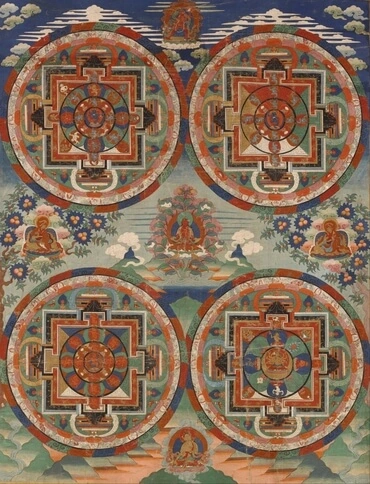1
В третий год Кира, царя Персидского, было откровение Даниилу, который назывался именем Валтасара; и истинно было это откровение и великой силы. Он понял это откровение и уразумел это видение.
2
В эти дни я, Даниил, был в сетовании три седмицы дней.
3
Вкусного хлеба я не ел; мясо и вино не входило в уста мои, и мастями я не умащал себя до исполнения трех седмиц дней.
4
А в двадцать четвертый день первого месяца был я на берегу большой реки Тигра,
5
и поднял глаза мои, и увидел: вот один муж, облеченный в льняную одежду, и чресла его опоясаны золотом из Уфаза.
6
Тело его – как топаз, лице его – как вид молнии; очи его – как горящие светильники, руки его и ноги его по виду – как блестящая медь, и глас речей его – как голос множества людей.
7
И только один я, Даниил, видел это видение, а бывшие со мною люди не видели этого видения; но сильный страх напал на них и они убежали, чтобы скрыться.
8
И остался я один и смотрел на это великое видение, но во мне не осталось крепости, и вид лица моего чрезвычайно изменился, не стало во мне бодрости.
9
И услышал я глас слов его; и как только услышал глас слов его, воцепенении пал я на лице мое и лежал лицем к земле.
10
Но вот, коснулась меня рука и поставила меня на колени мои и на длани рук моих.
11
И сказал он мне: „Даниил, муж желаний! вникни в слова, которые яскажу тебе, и стань прямо на ноги твои; ибо к тебе я послан ныне". Когда он сказал мне эти слова, я встал с трепетом.
12
Но он сказал мне: „не бойся, Даниил; с первого дня, как ты расположил сердце твое, чтобы достигнуть разумения и смирить тебя пред Богом твоим, слова твои услышаны, и я пришел бы по словам твоим.
13
Но князь царства Персидского стоял против меня двадцать один день; но вот, Михаил, один из первых князей, пришел помочь мне, и я остался там при царях Персидских.
14
А теперь я пришел возвестить тебе, что будет с народом твоим в последние времена, так как видение относится к отдаленным дням".
15
Когда он говорил мне такие слова, я припал лицем моим к земле и онемел.
16
Но вот, некто, по виду похожий на сынов человеческих, коснулся уст моих, и я открыл уста мои, стал говорить и сказал стоящему передо мною: „господин мой! от этого видения внутренности мои повернулись во мне, и не стало во мне силы.
17
И как может говорить раб такого господина моего с таким господиноммоим? ибо во мне нет силы, и дыхание замерло во мне".
18
Тогда снова прикоснулся ко мне тот человеческий облик и укрепилменя
19
и сказал: „не бойся, муж желаний! мир тебе; мужайся, мужайся!" И когда он говорил со мною, я укрепился и сказал: „говори, господин мой; ибо ты укрепил меня".
20
И он сказал: „знаешь ли, для чего я пришел к тебе? Теперь я возвращусь, чтобы бороться с князем Персидским; а когда я выйду, то вот, придет князь Греции.
21
Впрочем я возвещу тебе, что начертано в истинном писании; и нет никого, кто поддерживал бы меня в том, кроме Михаила, князя вашего.







